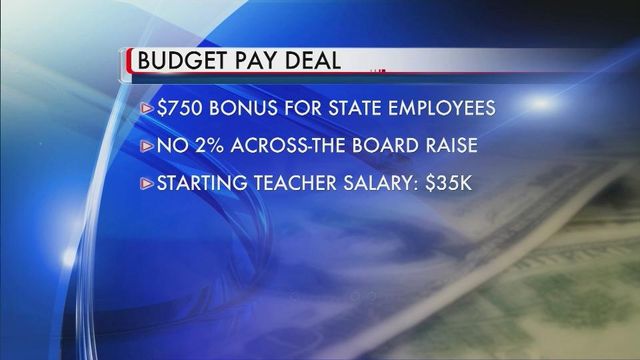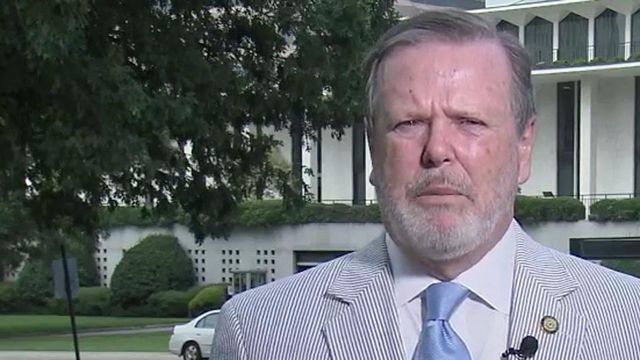Budget negotiators say state workers will get $750 bonus
House and Senate budget negotiators say they will give state employees and teachers $750 bonus payment this year in lieu of an across-the-board pay raise contemplated earlier this year.
Posted — UpdatedNow, budget writers responsible for each of those sections will work to hash out the details.
In addition to setting spending targets, negotiators have also agreed on how to handle pay raises for the vast majority of state employees and teachers.
In addition, teachers will move along their salary "steps" that increase salaries commensurate with experience, as will State Highway Patrol officers, court clerks and magistrates, Brown said. Senior teachers who have reached the end of the step range will also received "hold harmless" payments, he said.
There will also be money set aside to boost salaries for community college employees and certain hard-to-retain state workers, as well correctional officers, Brown said.
In total, the budget negotiators are setting aside roughly $335 million in various salary increases.
Rep. Chuck McGrady, R-Henderson, a House budget chairman, confirmed the bonus figures provided by Brown. According to McGrady, negotiators are still talking about how much of a cost-of-living increase to give to state retirees. The state can boost retirement payments by up to 1 percent without tapping any new spending due to returns on investments. The House budget would have raised retiree income by 2 percent.
For the average state worker, $750 amounts to 1.9 percent of his or her annual salary. However, this is a one-time bonus, meaning it won't affect future earnings.
"We always would prefer to see an increase in the base pay for state workers," said Ardis Watkins, a lobbyist for the State Employees Association of North Carolina.
Over the past five years, she said, state workers have lost buying power due to inflation.
But Watkins emphasized that the bonuses were better than nothing, especially considering that neither Gov. Pat McCrory nor the Senate included any pay bump for state workers in their original budget drafts.
"This is certainly better than nothing, but it's not going to help employees keep up with the cost of living in the long run," she said.
Watkins said her group hoped that budget writers would include five extra days of time off for state workers that House budget writers included in their draft of the budget. Watkins said that many workers use that time to take seasonal jobs during the State Fair or at Christmas to supplement their incomes.
Rodney Ellis, the president of the North Carolina Association of Educators, was not pleased with the details he heard coming from budget negotiators.
"A proposed one-time bonus shows the General Assembly has no long-range plan to address the impending teacher shortage crisis and the ability to recruit and retain quality educators to our public school classrooms," Ellis said. "North Carolina will continue to rank in the bottom tier of states when it comes to average teacher pay and per-pupil spending. Our students deserve better than this. Students deserve a quality, respected teacher in the classroom, and they deserve a legislature that will stop continually shortchanging them on the resources that will help make them successful."
Senate Finance Chairman Sen. Bob Rucho, R-Mecklenburg, said other negotiators are still working on tax changes that will be part of the budget deal. In particular, he said, lawmakers are looking for ways to further cut the personal income tax and raise the "zero bracket" – the amount of money on which nobody pays income tax. He said the goal is to raise that standard deduction from $15,000 to $17,500.
Related Topics
• Credits
Copyright 2024 by Capitol Broadcasting Company. All rights reserved. This material may not be published, broadcast, rewritten or redistributed.






